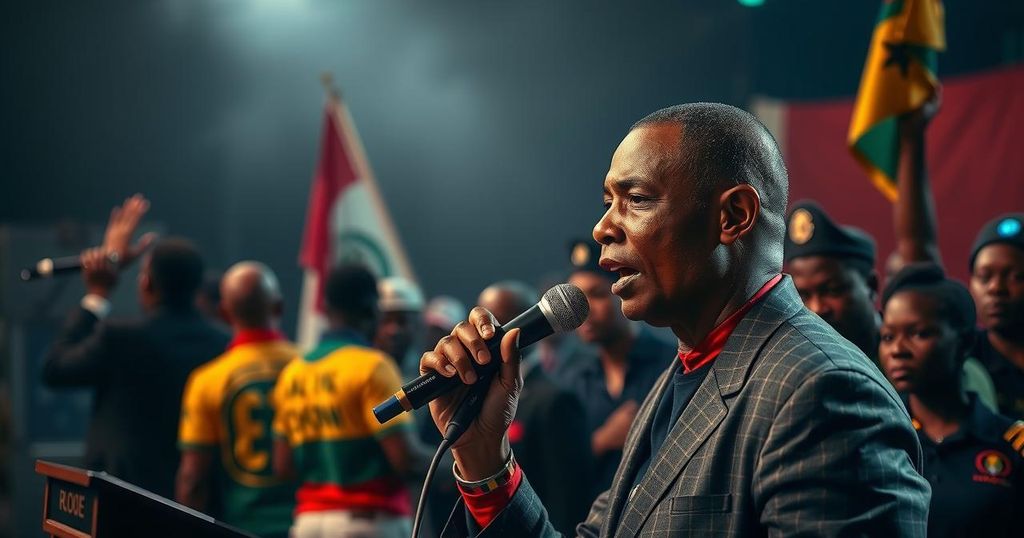Ghana’s December Elections: A Contest for Economic Stability and Change

Ghana’s upcoming elections on December 7 feature intense competition between former President John Mahama and current Vice President Mahamudu Bawumia. Mahama aims to implement a 24-hour economy to boost job creation amid a $30 billion debt recovery, while Bawumia focuses on economic stability post-pandemic. Voter sentiment reflects dissatisfaction with traditional parties, paving the way for potential shifts in the political landscape, with critical issues like inflation and employment at the forefront of discussions.
The upcoming national elections in Ghana on December 7 are shaping up to be extremely competitive, primarily between former President John Mahama of the National Democratic Congress and current Vice President Mahamudu Bawumia of the New Patriotic Party. Mahama has articulated plans to establish a 24-hour economy to stimulate job creation and aid recovery from the country’s substantial $30 billion external debt crisis. Conversely, Bawumia aims to fortify the economy amidst post-pandemic challenges and domestic pressures, striving for stability and growth.
Since the inception of multiparty democracy in 1992, Ghana has predominantly oscillated between these two major parties, leaving little room for minor parties to impact the electoral landscape significantly. As noted by University of Ghana scholar Kwame Asah Asante, the historical performance of smaller parties suggests that they have rarely surpassed an aggregate of 5% of the vote.
Many citizens express a desire for change as evidenced by poll sentiments. While individuals like Angela Ofori express indecision on their vote, desiring alternatives beyond the two established factions, there are emerging independent candidates like Nana Kwame Bediako, known as Cheddar, appealing to the youth with innovative ideas. His focus on eco-friendly policies and practical improvements mirrors a break from traditional political narratives, yet his influence on the election remains uncertain.
The underlying issues affecting Ghana’s voters include a struggling economy, education, health, infrastructure, and corruption. Particularly, the economy’s state, worsened by past debt defaults and ongoing inflation rates nearing historic highs, is central to voters’ concerns. Current Vice President Bawumia, recognized for his digitization initiatives, has solidified some voter support, while the challenges posed by illegal mining, or “galamsay,” further complicate the social and environmental landscape of Ghana.
Amid discontent with rising living costs, voter sentiments lean toward Mahama’s proposals for a 24-hour economy as a viable solution to widespread unemployment, contrasted by steadfast support for Bawumia’s digitization agenda. The political opposition remains fierce, as citizens grapple with economic instability where they witness fluctuating prices daily and seek impactful leadership through voting.
Ghana’s political climate remains dynamic, reflecting a stable democracy yet faced with pressing economic realities. As the nation approaches election day, the anticipated contest will embody the aspirations of its populace for change, accountability, and progressive governance.
The Ghanaian political landscape has been historically dominated by two major parties: the National Democratic Congress (NDC) and the New Patriotic Party (NPP) since the return to democratic rule in 1992. This dominance has influenced the voter base, leading to a reluctance among Ghanaians to support smaller parties, which have struggled to gain significant traction in elections. The economic backdrop of the current electoral cycle is characterized by post-pandemic recovery efforts, high external debt, and inflationary pressures, driving voters to prioritize leadership that promises economic stability and growth. The 2022 debt default significantly exacerbated the situation, along with external challenges like the global grain shortage linked to the conflict in Ukraine.
In summary, Ghana’s December elections are poised for intense competition between established political figures, John Mahama and Mahamudu Bawumia, amidst broader societal desires for change. The electorate’s focus on economic recovery and stability remains paramount, with critical issues like inflation and employment impacting voter decisions. Emerging candidates indicate a shifting political dynamic, yet the NDC and NPP continue to dominate the discourse. The outcome of this election will ultimately reflect the aspirations of Ghanaians for improved governance and economic resilience.
Original Source: www.voanews.com







